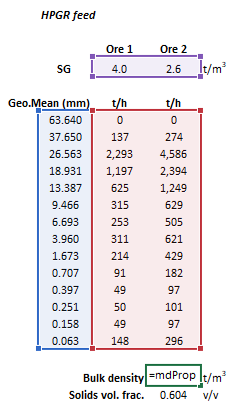Properties (Bulk Density): Difference between revisions
imported>Scott.Munro m (→Model theory) |
imported>Scott.Munro m (→Model theory) |
||
| Line 7: | Line 7: | ||
== Model theory == | == Model theory == | ||
{{Restricted content}} | |||
<hide> | |||
The bulk density of a particle assembly is defined as the total mass divided by the bulk volume it occupies, where bulk volume includes both the volume of particles and the empty, void space between them. | The bulk density of a particle assembly is defined as the total mass divided by the bulk volume it occupies, where bulk volume includes both the volume of particles and the empty, void space between them. | ||
| Line 64: | Line 67: | ||
* <math>Q_{\rm M}</math> is the mass flow rate of particles in the stream (t/h) | * <math>Q_{\rm M}</math> is the mass flow rate of particles in the stream (t/h) | ||
* <math>\rho_{\rm S}</math> is the Specific Gravity or density of solids (- or t/m<sup>3</sup>) | * <math>\rho_{\rm S}</math> is the Specific Gravity or density of solids (- or t/m<sup>3</sup>) | ||
</hide> | |||
== Excel == | == Excel == | ||
Latest revision as of 11:27, 4 December 2024
Description
This article describes the Evertsson (1999) method for estimating the dry bulk density of a polydisperse particle ensemble.[1]
The Evertsson method was derived for cone crusher products, but the relationships may also be applicable in similar mineral processing and materials handling contexts, e.g. conveyors and bins, screen or HPGR feed etc.
Model theory
Excel
The Evertsson bulk density estimation may be invoked from the Excel formula bar with the following function call:
=mdProps_BulkDensity_Evertsson(MeanSize as Range, Stream as Range, SG as Range, Optional returnPackFrac as Boolean = false)
Invoking the function with no arguments will print Help text associated with the model, including a link to this page.
The input parameters and calculation results are defined below in matrix notation, along with an example image showing the selection of the same cells and arrays in the Excel interface:
|
| ||||
References
- ↑ Evertsson, C.M., 1999. Size reduction in cone crushers. In Minerals Engineering Conference '99, Falmouth, England, 22-24 September 1999.
![{\displaystyle {\begin{aligned}MeanSize&={\begin{bmatrix}{\bar {d}}_{1}{\text{ (mm)}}\\\vdots \\{\bar {d}}_{31}{\text{ (mm)}}\\\end{bmatrix}}\\\\{\mathit {Stream}}&={\begin{bmatrix}(Q_{\rm {M}})_{11}{\text{ (t/h)}}&\dots &(Q_{\rm {M}})_{1m}{\text{ (t/h)}}\\\vdots &\ddots &\vdots \\(Q_{\rm {M}})_{n1}{\text{ (t/h)}}&\dots &(Q_{\rm {M}})_{nm}{\text{ (t/h)}}\\\end{bmatrix}}\\\\{\mathit {SG}}&={\begin{bmatrix}(\rho _{\rm {S}})_{1}{\text{ (t/m}}^{\text{3}}{\text{)}}&\dots &(\rho _{\rm {S}})_{m}{\text{ (t/m}}^{\text{3}}{\text{)}}\\\end{bmatrix}}\\\\{\mathit {returnPackFrac}}&={\big [}({\text{True / False)}}{\big ]}\end{aligned}}}](https://wikimedia.org/api/rest_v1/media/math/render/svg/d6d00b61b361e569269897963673990616be01b8)




